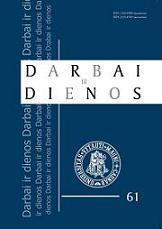Piliečiai ar svetimšaliai? Lietuvos lenkai nacionaliniame viešajame diskurse 2011 metais
Citizens or foreigners? Lithuania‘s poles in the national public discourse of 2011
Author(s): Andrius ŠvarplysSubject(s): Cultural Essay, Political Essay, Societal Essay
Published by: Vytauto Didžiojo Universitetas
Keywords: Lenkų tautinė mažuma; Viešasis diskursas; Politinis įtraukimas–išskyrimas; Lietuvos ir Lenkijos santykiai Polish national minority; Public discourse; Political inclusion-excliusion; Lithuania-Poland relationship Lenkų tautinė mažuma; Viešasis diskursa
Summary/Abstract: Straipsnyje analizuojamas Lietuvos lenkų tautinės mažumos reprezentavimas nacionalinėje žiniasklaidoje 2011 m., iki ir po Seimo kovo 17 d. priimto Švietimo įstatymo pataisų, kurios susiaurino tautinių mažumų teises. Pagrindinė straipsnyje keliama problema yra ištirti, kiek traukiančiai ir kiek išskiriančiai lenkų tautinė mažuma yra svarstoma Lietuvos viešajame diskurse. Ištyrimo duomenų seka pagrindinė išvada, kad Lietuvos žiniasklaida lenkų tautinėje mažumoje sunkiai atpažįsta „Kitą“ kaip savo valstybės piliečius, priskirdama realias vietinių lenkų problemas „blogam politikavimui“ ar panardindama jas į gynybos–puolimo retoriką. Tačiau Lietuvos viešajame diskurse galima rasti ir atsvarą šiai tendencijai – informacinio, analitinio, pilietiškai įtraukiančio ir tautinės nesantaikos retoriką peržengiančio diskurso. Vis dėlto bendra debatų atmosfera liudija, kad lietuvių ir lenkų santykiuose egzistuoja tam tikras nepasitikėjimas ir tai yra giluminė šaknis, grindžianti visą abiejų tautų santykių diskutavimo kontekstą Lietuvos viešajame diskurse. This article explores the Lithuanian public discourse in the mass media by addressing the problem of exclusion and inclusion of the Polish national minority in the Lithuanian political community and in the Lithuanian collective identity. On March 17, 2011, the Lithuanian Parliament passed Amendments to the Education Act that diminished to some extent the rights of national minorities in education. The Polish national minority, the largest such in Lithuania, reacted very strongly and negatively and organized public protests. These actions were accompanied by the involvement of highest–rank Polish and Lithuanian politicians and huge public debates in the mass media. The public sphere and public debates are key factors in the process of political community formation (Jürgen Habermas), national collective memory and identity (Thomas Risse, Bo Sträth), and inclusion or exclusion of the “Other.” The most evident tendency is that Lithuanian public discourse and mass media still suffer from an unability to view Lithuania’s Poles as equal members of the same political community. The general athmosphere of the public debates is penetrated by mutual distrust on both (the Lithuanian and the Polish) sides; and this can be explained by an ambivalent historical relationship (Polish cultural and political domination over Lithuania and the Vilnius occupation by Poland from 1920 to 1939), although such historical memory is not loudly and widely expressed in the mass media. The result is that the Polish national minority is still the alien “Other” for the Lithuanian mass media. Local Polish needs are still unknown and unrecognized as legitimate claims of “our citizens.” Public opinion in the mass media is still dominated by a conviction that the main problem lies in the bad actions of politicians who are trying to mobilize their electorate by exploiting the minority issue.
Journal: Darbai ir dienos
- Issue Year: 2014
- Issue No: 61
- Page Range: 37-50
- Page Count: 14
- Language: Lithuanian

